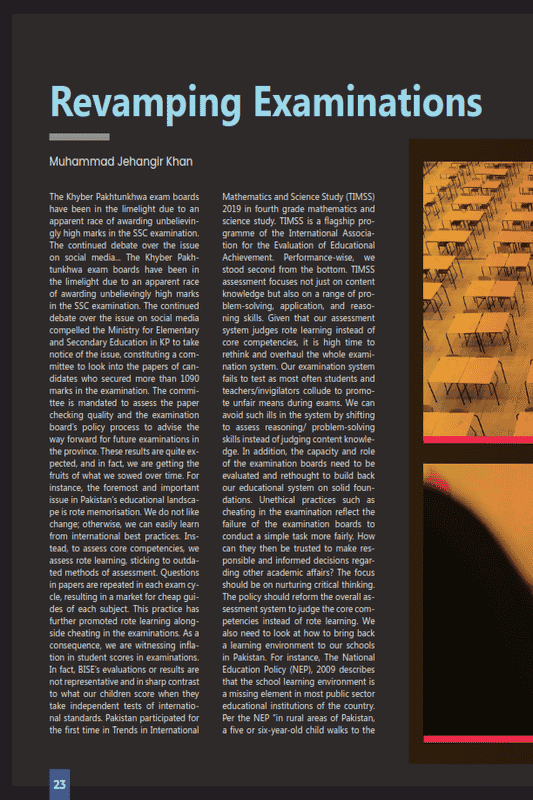Revamping Examinations (P & R Vol.2 Issue 11)
The Khyber Pakhtunkhwa exam boards have been in the limelight due to an apparent race of awarding unbelievingly high marks in the SSC examination. The continued debate over the issue on social media… The Khyber Pakhtunkhwa exam boards have been in the limelight due to an apparent race of awarding unbelievingly high marks in the SSC examination. The continued debate over the issue on social media compelled the Ministry for Elementary and Secondary Education in KP to take notice of the issue, constituting a committee to look into the papers of candidates who secured more than 1090 marks in the examination. The committee is mandated to assess the paper checking quality and the examination board’s policy process to advise the way forward for future examinations in the province. These results are quite expected, and in fact, we are getting the fruits of what we sowed over time. For instance, the foremost and important issue in Pakistan’s educational landscape is rote memorisation. We do not like change; otherwise, we can easily learn from international best practices. Ins- tead, to assess core competencies, we assess rote learning, sticking to outdated methods of assessment. Questions in papers are repeated in each exam cycle, resulting in a market for cheap guides of each subject. This practice has further promoted rote learning alongside cheating in the examinations. As a consequence, we are witnessing inflation in student scores in examinations. In fact, BISE’s evaluations or results are not representative and in sharp contrast to what our children score when they take independent tests of international standards. Pakistan participated for the first time in Trends in International
Mathematics and Science Study (TIMSS) 2019 in fourth grade mathematics and science study. TIMSS is a flagship programme of the International Association for the Evaluation of Educational Achievement. Performance-wise, we stood second from the bottom. TIMSS assessment focuses not just on content knowledge but also on a range of problem-solving, application, and reasoning skills. Given that our assessment system judges rote learning instead of core competencies, it is high time to rethink and overhaul the whole examination system. Our examination system fails to test as most often students and teachers/invigilators collude to promote unfair means during exams. We can avoid such ills in the system by shifting to assess reasoning/ problem-solving skills instead of judging content knowledge. In addition, the capacity and role of the examination boards need to be evaluated and rethought to build back our educational system on solid foundations. Unethical practices such as cheating in the examination reflect the failure of the examination boards to conduct a simple task more fairly. How can they then be trusted to make responsible and informed decisions regarding other academic affairs? The focus should be on nurturing critical thinking. The policy should reform the overall assessment system to judge the core competencies instead of rote learning. We also need to look at how to bring back a learning environment to our schools in Pakistan. For instance, The National Education Policy (NEP), 2009 describes that the school learning environment is a missing element in most public sector educational institutions of the country. Per the NEP “in rural areas of Pakistan, a five or six-year-old child walks to the
school dreading what he or she would face…They know that they may have to sit on a cold floor in winters and a hot one in summers provided they are lucky enough to have a school building otherwise the tree is the only shade available to the children. “Toilets are a luxury and wherein some schools exist, the ratio is extremely poor. Library facilities are very rudimentary and teaching aid material is generally in short supply. Games, sports, and other co-curricular activities such as debating contests, drawing competitions, skills/arts and crafts training, and cultural activities that positively contribute to the overall development of school children are missing from most schools. School infrastructure facilities are highly inadequate”. Focusing on improving these simple and basic issues in the system can mean a lot for transforming our education system in the right direction.
The article has been published in
The News.




